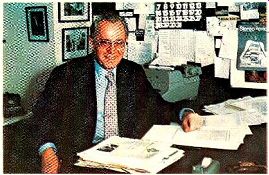
ART AND ARTISTS
By William Anderson
I WISH he didn't have to be a star, I wish he could be a nobody, he's so talented." So says singer Barbara Lea of singer Mel Torme in a recent interview with Whitney Balliett in the New Yorker. That seems to be a rather cockeyed point of view for any artist to have about her profession, but Miss Lea is a woman with a reputation for meaning what she says, and what she is saying here is that great performing artistry has no necessary connection with popular success.
That point of view is, moreover, axiomatic among show-business professionals, whose heroes and heroines--the "actors' actors" and "singers' singers"--are seldom appreciated by the general public. But it is not so well understood by audiences, who deal habitually in unexamined absolutes: "If she's not any good, how come she sells so many records?" "If he's so great, how come I've never heard of him?" Attempts to answer such questions usually fail because questioner and answerer are simply not talking about the same thing. The former is talking about the artist, which is to say personality, sex appeal, and all those other winning ways that together make up the otherwise indescribable bundle of attributes known as "star quality." The latter is talking about the art, which is a God-given talent to which is added that collection of laboriously acquired skills known as "performing ability"--to be seen, heard, described, and in some cases even measured (flat is flat).
This brings us back inevitably to an old concern in these pages-the battle between reader (questioner) and critic (answerer). As even a casual skimmer of our letters column knows, most of our readers are artist-orient ed. They tend to be what the French call "in conditionals": once they have given their hearts, those hearts stay given, whatever the artistic accomplishments involved. This is no particular strain, for their devotion is based not so much on performing ability as it is on "personality," and that rarely changes.
Though such emotional fidelity does have its attractive side, it is often accompanied by a most unattractive style of argument: the hero is defended not by recourse to artistic values (there may not be any, of course), but by the quoting of sales figures, personal attacks on the critic, on other artists, and even on other artists' audiences. When a hero falls from grace, he often does so not for artistic but for "public-relations" reasons. (Andy Williams was not asked to master the ceremonies for the Grammy Awards this year. Is that be cause he is singing less well these days or be cause the mother of his children is apparently careless with firearms?) All such concerns are as nothing to the art-oriented critic. His heart goes out only on loan, and he is apt to call it in at the first sign of artistic decline. And that heart is also (in the best of critics, to be sure) as invulnerable to blandishments unconnected with artistic performance as his head is to sales figures great or small. An honest critic is therefore destined to almost certain unpopularity with the greater part of the public; he will be found incomprehensibly ungenerous when he fails to salute a newly discovered superstar and fickle when he deserts a fading minor one.
To return to Barbara Lea and the rather shocking idea that to be a great popular entertainer is not necessarily to be a great artist:
this is of course a generalization from any number of particular cases, and there are al ways exceptions. How, for instance, to explain Frank Sinatra and Bing Crosby, both sublimely accomplished artists, both popular superstars? I would guess that they have probably had two mutually exclusive audiences, a large one attracted by Sinatra's two fisted raffishness and Crosby's parish priestliness, and a smaller one by their vocal wizard ry. How nice--but how unusual--to have it both ways.
Also see:
Link | --LETTERS TO THE EDITOR
Source: Stereo Review (USA magazine)